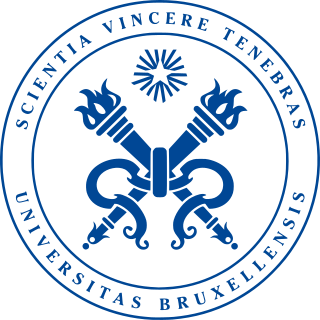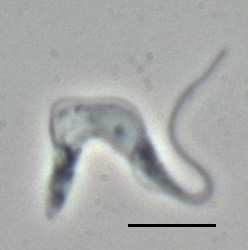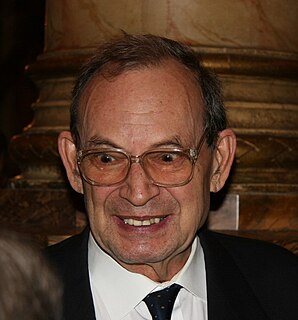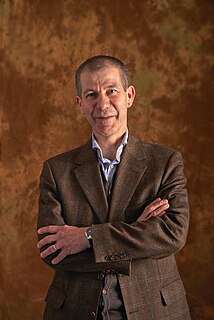Related Research Articles

The Université libre de Bruxelles is a French-speaking research university in Brussels, Belgium. ULB is one of the two institutions, which trace their origins to the Free University of Brussels, founded in 1834 by Belgian lawyer Pierre-Théodore Verhaegen.

Trypanosoma brucei is a species of parasitic kinetoplastid belonging to the genus Trypanosoma. This parasite is the cause of vector-borne diseases of vertebrate animals, including humans, carried by species of tsetse fly in sub-Saharan Africa. In humans T. brucei causes African trypanosomiasis, or sleeping sickness. In animals it causes animal trypanosomiasis, also called nagana in cattle and horses. T. brucei has traditionally been grouped into three subspecies: T. b. brucei, T. b. gambiense and T. b. rhodesiense. The first is a parasite of non-human vertebrates, while the latter two are known to be parasites of humans. Only rarely can the T. b. brucei infect a human.

Trypanosoma evansi is a species of excavate trypanosome in the genus Trypanosoma that causes one form of surra in animals. It has been proposed that T. evansi is—like T. equiperdum—a derivative of T. brucei. Due to this loss of part of the mitochondrial (kinetoplast) DNA T. evansi is not capable of infecting the invertebrate vector and establishing the subsequent life-stages. Due to its mechanical transmission T. evansi is not restricted to transmission via the tsetse fly but shows a very broad vector specificity including the genera Tabanus, Stomoxys, Haematopota, Chrysops and Lyperosia. It rarely causes disease in humans, indeed, it has only been recorded in cases where the patient lacks a normal component of human serum, Apolipoprotein L1. T. evansi is very common in India and Iran and causes acute disease in camels and horses, and chronic disease in cattle and buffalo. In Pakistan, it has been found to be the most prevalent trypanosome species in donkeys. Haemoglobin plays a role in trypanolytic host defense against T. evansi.
Jean Louis Auguste Brachet was a Belgian biochemist who made a key contribution in understanding the role of RNA.
Bruno J. M. T. G. van Pottelsberghe de la Potterie is a Belgian economist. He is a Full-Time Professor at the Solvay Brussels School of Economics and Management (SBS-EM), Brussels, Belgium, of which he was the Dean from 2011 to 2017, and a Senior Fellow at the Bruegel think-tank in Brussels.
Jacques Errera was a Belgian physicochemist, specialized in the molecular constitution of matter. He worked at the Université Libre de Bruxelles (ULB). He was the son of Isabelle Errera. In 1938, he was awarded the Francqui Prize in Exact Sciences.
Raymond Jeener (1904–1995) was a Belgian molecular biologist and professor at the Universite Libre de Bruxelles (ULB). In 1954, he was awarded the Francqui Prize on Biological and Medical Sciences.

Léon Charles Prudent Van Hove was a Belgian physicist and a Director General of CERN. He developed a scientific career spanning mathematics, solid state physics, elementary particle and nuclear physics to cosmology.

Radu Bălescu was a Romanian and Belgian scientist and professor at the Statistical and Plasma Physics group of the Université Libre de Bruxelles (ULB).
Jean-Édouard Desmedt was a Belgian scientist and professor at the Universite Libre de Bruxelles (ULB), who was awarded the Francqui Prize on Biological and Medical Sciences for his work on neurophysiology. He is a member of the Académie nationale de Médecine in France, and the Natural Science Section of the Royal Academy of Science, Humanities and Fine Arts of Belgium.
Marc Wilmet was a Belgian linguist and professor at the Université libre de Bruxelles. In 1986, he was awarded the Francqui Prize on Human Sciences.
Gilbert Vassart is a Belgian scientist and professor at the Universite Libre de Bruxelles. His research interests include molecular endocrinology, especially related to the thyroid, and pharmacology of G protein-coupled receptor along with medical genetics.

Mathias François Dewatripont is a Belgian economist and professor at the Université libre de Bruxelles (ULB) and visiting professor at the Massachusetts Institute of Technology (MIT).
Marc Parmentier is a Belgian scientist, and professor at the Institute of Multi-disciplinary Research in Human and Molecular Biology (IRIBHM) of the Université Libre de Bruxelles (ULB), where he completed his PhD in 1990. His research interest is on G protein-coupled receptors (GPCR), and of transgenic models of human pathologies. In 1999, he was awarded the Francqui Prize on Biological and Medical Sciences.

Marc, Baron Henneaux is a Belgian theoretical physicist and professor at the Université Libre de Bruxelles (ULB) who was born in Brussels on 5 March 1955.
Éric Remacle was a Belgian scientist and professor at the Department of Political Sciences of the Universite Libre de Bruxelles (ULB). In 2000, together with Paul Magnette, he was awarded the Exceptional Francqui Prize for European Research.
Pierre Gaspard is a Belgian physicist and professor at the Interdisciplinary Center for Nonlinear Phenomena and Complex Systems and the Service de Physique Non-Linéaire and Mécanique Statistique of the Universite Libre de Bruxelles (ULB). His research interests are on nonlinear physics, statistical physics, and chemical physics.

Apolipoprotein L1 is a protein that in humans is encoded by the APOL1 gene. Two transcript variants encoding two different isoforms have been found for this gene.
Piet Borst is emeritus professor of Clinical Biochemistry and Molecular Biology at the University of Amsterdam (UVA), and until 1999 Director of Research and Chairman of the Board of Directors of the Netherlands Cancer Institute and the Antoni van Leeuwenhoekziekenhuis (NKI-AVL). He continued to work at the NKI-AVL as a staff member and group leader until 2016.
Miriam Cnop is a Belgian researcher and physician specializing in diabetology. She is Professor of Medicine at Université Libre de Bruxelles and Clinical Director of Erasmus Hospital’s Endocrinology Department. Her work centered on type 2 diabetes, in particular mechanisms of lipotoxicity using human islets of Langerhans and human induced pluripotent stem cell-derived β Cells. She is an associate member of the Royal Academy of Medicine of Belgium. In 2013, her work was awarded the Oskar Minkowski prize from the European Association for the Study of Diabetes.
References
- Vanhollebeke B, De Muylder G, Nielsen MJ, Pays A, Tebabi P, Dieu M, Raes M, Moestrup SK, Pays E., A haptoglobin-hemoglobin receptor conveys innate immunity to Trypanosoma brucei in humans, Science. 2008 May 2;320(5876):677–81.
- Vanhollebeke B, Truc P, Poelvoorde P, Pays A, Joshi PP, Katti R, Jannin JG, Pays E., Human Trypanosoma evansi infection linked to a lack of apolipoprotein L-I., N Engl J Med. 2006 Dec 28;355(26):2752–6.
- Vanhamme L, Paturiaux-Hanocq F, Poelvoorde P, Nolan DP, Lins L, Van Den Abbeele J, Pays A, Tebabi P, Van Xong H, Jacquet A, Moguilevsky N, Dieu M, Kane JP, De Baetselier P, Brasseur R, Pays E., Apolipoprotein L-I is the trypanosome lytic factor of human serum, Nature. 2003 Mar 6;422(6927):83–7.